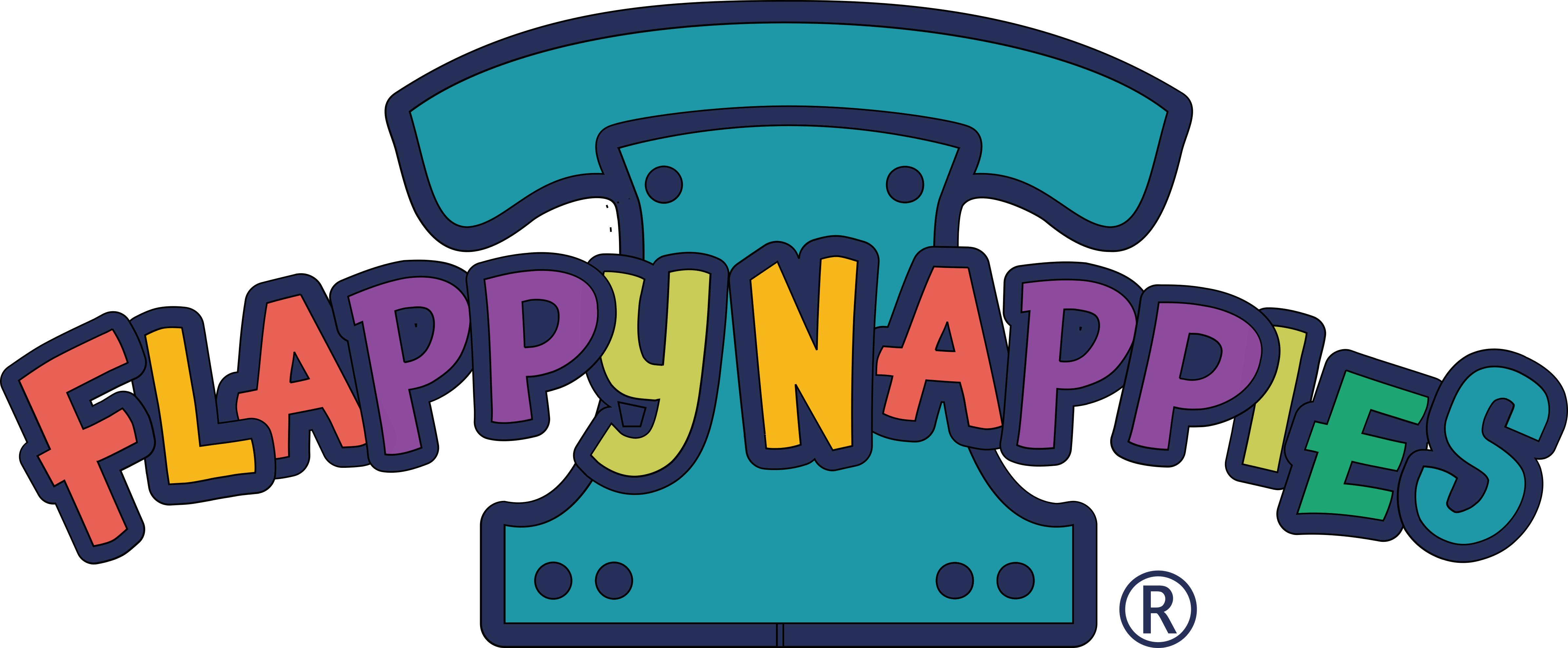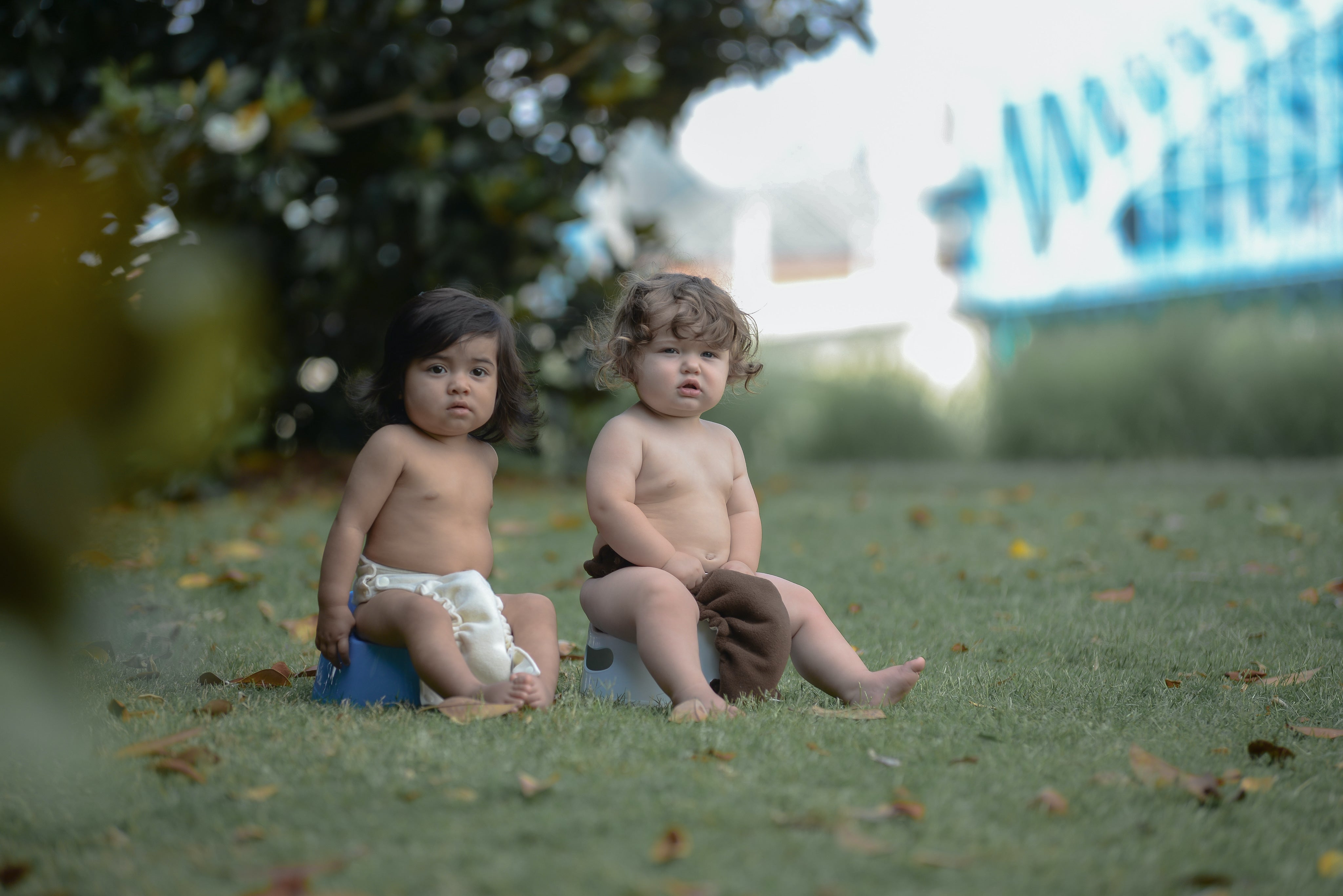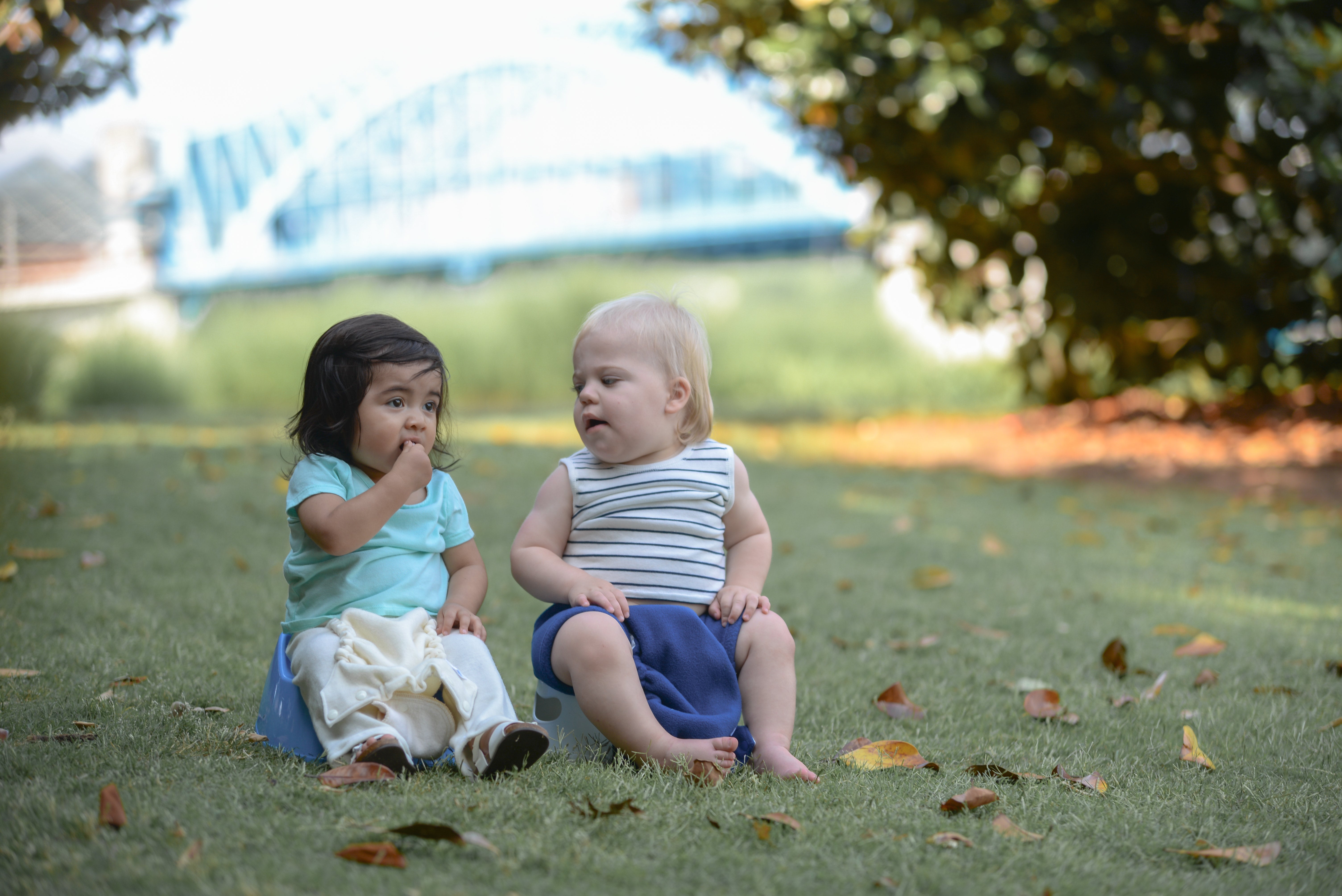Disposable Diaper Companies are Lying to You

You’ve heard that you should wait until your toddler is ready to potty train, usually around age 2-3, although in some cases as late as 4 or even older. But Great Grandma claims she had her babies out of diapers by 18 months. She's lying, right? Nope!
In the 1950's, the average age a child completed toilet training in the US was 18 months. Today, the average age has doubled to THREE YEARS OLD. How did this happen? Two words: Disposable Diapers.
Of course, there’s the obvious reason parents who use disposables wait longer to potty train: When every dirty diaper needs to be washed (by hand or machine), parents have motivation to quit using them entirely. When diapers can simply be thrown away, it becomes easier to wait.

Cloth diapers also aid potty training because babies can feel when they're wet much better than in disposables.
But there's a more insidious factor at play. Decades ago, disposable diaper companies realized they could double their profits if they convinced parents to wait as long as possible to introduce the potty. The "wait 'til they're ready" movement was born and man, did it work.
They leveraged our mom guilt against us and now we're shaming each other for "rushing" potty-training if we start "too soon". Any setbacks or resistance from the child are presented as evidence that we "pushed" the potty “too young”. Well-meaning parents who wait and wait for "readiness" sometimes even end up with Kindergarteners who are not properly potty trained.
Here’s a fact: “Wait ‘til they’re ready” is a marketing strategy. It was invented by disposable diaper companies to sell more diapers. Potty training takes time and attention. So, Big Diaper created a product that was convenient and easy to use and then hired a pediatrician spokesman to give parents permission to put off potty training as long as they wanted.
The result? Millions of tons of waste end up in landfills every year, millions of tons of non-renewable resources are tossed in the trash, and potty training often gets even harder the longer you wait.
The only benefactors of “wait ‘til they’re ready” are the disposable diaper companies.

The environment suffers at the expense of Big Diaper.
Five Lies Big Diaper is Telling You
Big Diaper may have invented "wait 'til they're ready" decades ago, but it has since become culturally ingrained. However, many of the soundbites perpetuating the "readiness" myth are nothing short of lies. Here's five of the big ones.
1. Big Diaper says your baby can’t control her bladder or bowels until she’s two.
That’s a lie. Babies are born with bladder and bowel control, and they have instincts to not soil themselves. If you hold a diaperless newborn over the toilet in a squat position and say “pss pss”, she will instinctively pee or poop.
For millennia before disposable diapers existed, parents held their babies out at key moments over a chamber pot (potty!) to pee and poop. You can introduce the potty at any age, even as young as birth, and it won’t hurt her one bit. Teaching your baby to associate elimination with the potty results in a smooth transition out of diapers at a much younger age (this is often called Elimination Communication or EC).

Newborn babies are capable of eliminating into a potty with assistance.
Cultures all around the world still raise their babies successfully with minimal or no diapers. Great Grandma managed to teach all her babies to use the potty just fine—you can, too!
2. Big Diaper says that "rushing" potty training is bad.
That's a lie. It is true that punitive potty training methods were favored in the 1950's, but that does not mean "early" potty training is inherently harmful. There is no age requirement for a potty training method to be abusive any more than there is an age requirement for potty training to be loving and gentle.

The potty can be introduced in an enjoyable way for baby!
Big Diaper says your kid needs to be "emotionally ready" to give up diapers. But, Big Diaper also says that your child needs to wear their diapers 24/7 for years, thus creating the emotional attachment to the diaper in the first place. Kids who are introduced to the potty in infancy do not develop the same kind of dependency on the diaper that exclusively diapered children do.
In fact, delaying potty training risks causing damage to your child's bladder and disposable diaper use has been linked to bedwetting past age 5.
3. Big Diaper says that EC is too hard.
That’s a lie. Imagine having a baby and never needing to change poopy diapers—pure fantasy, right? Nope! Many EC parents are living this reality and loving it. Even Pampers tells you that poops are simple to predict (except that their advice is to just sit there and watch your kid poop himself instead of putting him on the potty).
Many parents do EC part time, as little as once a day. And when it’s time to finish using diapers completely, EC kids are one step ahead of their exclusively diapered peers. They already understand the association between elimination and the potty, and most are done with diapers around 18 months—exactly like Great Grandma claimed.

There are no rules to EC! Keep it fun and low stress for both you and baby.
4. Big Diaper says that cloth diapers are gross, hard to use, and time consuming.
That’s a lie. Cloth diapers have come leaps and bounds from the rectangles of cloth, giant safety pins, and plastic pants Great Grandma used. Nowadays the only difference between a disposable diaper and an all-in-one cloth diaper is that you chuck the cloth one in the hamper when you’re done instead of the trash.

All-in-one diapers and pocket diapers are the simplest to use!
Many parents use cloth diapers in combination with EC to simplify their diaper laundry. The child’s poop goes directly in the toilet where it belongs, keeping messy diapers to a minimum, while pee diapers go straight in the wash with no fuss. Switching to cloth diapers means adding no more than an extra 10 minutes to your day, and you’ll save thousands of dollars down the line.
5. Big Diaper says cloth diapers are just as bad for the environment as disposable diapers.
That's the biggest lie of all. Dumping 2,000-3,000 non-recyclable diapers per baby per year into a landfill each year sounds very bad. So what did Big Diaper do? They pointed the finger at cloth diapers and whined, "But they're just as bad!"
Then they sponsored biased studies to "prove" their point. These studies spawned articles that, decades later, are still falsely reassuring concerned parents that disposable diapers aren't all that bad for the environment.
Here's the problem: Most of these studies focus exclusively on disposable diapers filling up landfills and on the water and energy requirements for laundering cloth and fail to take into account the following worrying facts about disposable diapers:
- They introduce feces into groundwater
- They have an enormous transportation emissions footprint
- They are made from petroleum plastics and their production contributes to oil drilling
- They are filled with synthetic perfumes, dyes, and phthalates
- They release greenhouse gasses in landfills
- They take 500+ years to decompose

Disposable diapers often end up in the environment. Photo credit: Rebecca Larsen.
The studies also fail to take into account the following facts about cloth diapers:
- In the decades since many of the studies were done, washing machines have become more water-efficient and the electricity that powers washers/dryers has been greatly decarbonized.
- The studies focused exclusively on cloth diapers made of cotton, which requires a lot of water to grow. Other natural materials, such as bamboo, wool, and hemp, require much less water to produce and wool requires minimal water for washing.
- The studies failed to take into account that cloth diapers can be used for many years, over multiple children in the home. They can also be passed on to other families or repurposed as cleaning rags.
- The studies failed to take into account the enormous difference between the average age a child in cloth diapers is typically toilet trained verses one who wears disposables.
In 2023, a rigorous study was published by the UK Department for Environment Food and Rural Affairs that compared the environmental impacts of cloth vs. disposable diapers. The conclusions from that study are as follows:
- Cloth diapers produce 25% less CO2 than disposables
- The environmental impact of production is over 90% lower for cloth diapers than disposables
- The environmental impact of trashing a disposable diaper is 9 times higher than that for a cloth diaper
- Disposable diapers use approximately 98% more resources to produce than cloth diapers
- If every child in the UK in diapers used cloth rather than disposable, it would save the equivalent of 700 million car miles of CO2 - that's nearly 3,000 journeys to the moon in a car!
- Even when factoring in the washing and drying, cloth diapers are still the best diaper choice for the environment
Big Diaper's outrageous claim that disposable diapers are "just as bad" as cloth can now--hopefully--be put to rest.
Have I Waited Too Long to Introduce the Potty?
Big Diaper tells you to wait to introduce the potty until your child is “ready” with no concrete definition of what “ready” really means. Signs of readiness are arbitrary and could occur at any age—in fact, many signs of “readiness”, such as being dry after a nap, are apparent in newborns!
You don't need to wait any longer! It’s never too early or too late to introduce the potty. At Flappy-Nappies®, we have all the resources you need to start the potty in our potty-training guide, Diapers Stink!
You can access the age-based guide, comprehensive troubleshooting FAQ, and digital workshops by clicking here. This guide is FREE to use instantly when you sign up for our mailing list.
Disposable diaper companies want your kid in diapers for as long as possible because it’s profitable for them. But it’s not profitable for you or your child—so why not do things differently?






Leave a comment